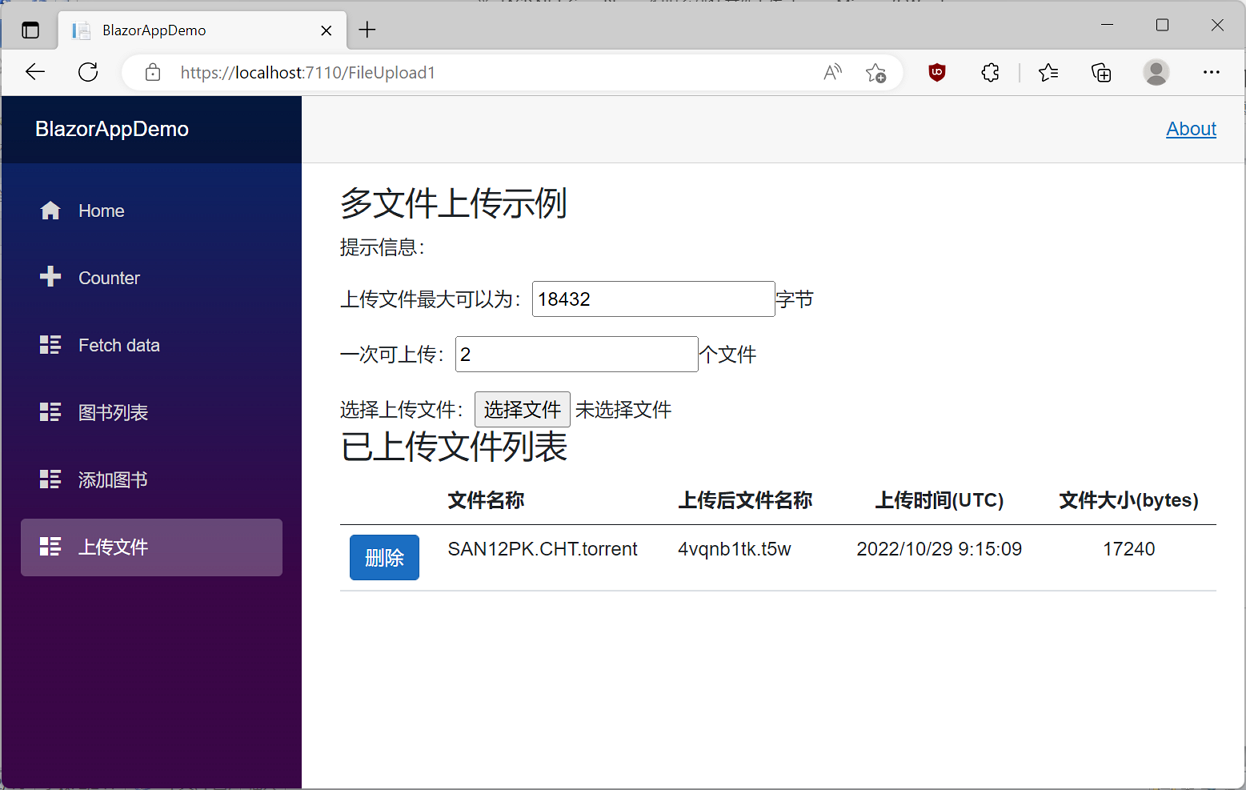学习ASP.NET Core Blazor编程系列文章之目录学习ASP.NET Core Blazor编程系列一——综述学习ASP.NET Core Blazor编程系列二——第一个Blazor应用程序(上)
学习ASP.NET Core Blazor编程系列三——实体学习ASP.NET Core Blazor编程系列五——列表页面学习ASP.NET Core Blazor编程系列七——新增图书学习ASP.NET Core Blazor编程系列八——数据校验学习ASP.NET Core Blazor编程系列十三——路由(完)学习ASP.NET Core Blazor编程系列十五——查询学习ASP.NET Core Blazor编程系列十六——排序 学习ASP.NET Core Blazor编程系列十七——文件上传(上) 学习ASP.NET Core Blazor编程系列十八——文件上传(中) 六、添加文件上传列表Blazor组件页面
- 在Visual Studio 2022的解决方案资源管理器中,找到“Pages”文件夹,然后点击鼠标右键在弹出菜单中选择“添加-->新建文件夹”,然后把文件夹命名为“Descri”。如下图。
2. 在“Descri”文件夹上使用鼠标右键单击,在弹出菜单中选择“添加-->Razor组件…”,
3.在弹出对话框中选择“Razor组件”,在名称输入框中输入“UpFileInfoList.razor”,然后点击“添加”按钮。如下图。
4.UpFileInfoList这个页面用于显示已经上传的文件信息,这个页面的具体内容如下: - @page "/Descri/UpFileInfoList"
- @using BlazorAppDemo.Models
- @using BlazorAppDemo.Utils
- @using Microsoft.EntityFrameworkCore
-
- @inject IDbContextFactory<BookContext> dbFactory
-
- <h3>已上传文件列表</h3>
- <table class="table" width="99%">
- <thead>
- <tr>
- <th></th>
- <th>
- @HtmlHelper.GetDisplayName(fileDesc,m=>m.Name)
-
- </th>
- <th>
- @HtmlHelper.GetDisplayName(fileDesc ,m=> m.NewName)
- </th>
-
- <th class="text-center">
- @HtmlHelper.GetDisplayName(fileDesc ,m=>m.UploadDateTime)
- </th>
- <th class="text-center">
- @HtmlHelper.GetDisplayName(fileDesc ,m=> m.FileSize)
- </th>
- </tr>
- </thead>
- <tbody>
- @foreach (var item in fileDescs)
- {
- <tr>
- <td>
- <button id="delete" class="btn btn-primary" @onclick="@(e => DeleteFile(e, @item.ID))">删除</button>
- </td>
- <td>
- @item.Name
-
- </td>
- <td>
- @item.NewName
-
- </td>
- <td class="text-center">
- @item.UploadDateTime)
- </td>
- <td class="text-center">
- @item.FileSize
- </td>
- </tr>
- }
- </tbody>
- </table>
-
- @code {
- private static BookContext _context;
-
- private List<FileDescribe> fileDescs = new List<FileDescribe>();
- private FileDescribe fileDesc = new FileDescribe();
- protected override async Task OnInitializedAsync()
- {
- _context = dbFactory.CreateDbContext();
- fileDescs = _context.FileDescribe.ToList();
- await base.OnInitializedAsync();
- }
- public void DeleteFile(MouseEventArgs e, int Id)
- {
- List<int> listId = new();
- listId.Add(Id);
- var entity = _context.Find<FileDescribe>(listId.ToArray());
- _context.Remove<FileDescribe>(entity);
- _context.SaveChangesAsync();
- }
- }
-
七、实现Html.DisplayNameFor功能 在ASP.NET CORE MVC中有一个非常有用的类Html,其中有一个方法DisplayNameFor(m=>m.Name),根据实体类中属性上的特性Display所描述的信息,在页面上显示。在Blazor中默认没有这个功能,需要我们自己来实现。
1. 如第六点中的代码, 我们使用@HtmlHelper.GetDisplayName方法来显示每个类属性的名称。 FileDescribe实体类中的 Display 特性提供这属性需要在页面上的显示值。 例如,Name属性通过特性[Display(Name = "文件名称")]进行设置,因此呈现窗体时会显示“文件名称”。如下图。
2.接下来我们来实现这个辅助类,在Visual Studio 2022的解决方案资源管理器中,选中“Utils”文件夹,单击鼠标右键,在弹出的快捷菜单中选择“添加-->类”,在弹出的“添加新项”对话框的名称输入框中,输入“HtmlHelper”,然后使用鼠标左键点击“添加”按钮,创建一个新的类,代码如下 : - using System.ComponentModel.DataAnnotations;
- using System.ComponentModel;
- using System.Linq.Expressions;
- using System.Reflection;
-
- namespace BlazorAppDemo.Utils
- {
- public static class HtmlHelper
- {
- //an use the below extension method:
- public static string GetDisplayName<TModel, TProperty>(this TModel model, Expression<Func<TModel, TProperty>> expression)
- {
- Type type = typeof(TModel);
- MemberExpression memberExpression = (MemberExpression)expression.Body;
- string propertyName = ((memberExpression.Member is PropertyInfo)? memberExpression.Member.Name : null);
-
- DisplayAttribute attr;
- attr = (DisplayAttribute)type.GetProperty(propertyName).GetCustomAttributes(typeof(DisplayAttribute), true).SingleOrDefault();
-
-
- if (attr == null)
- {
- MetadataTypeAttribute metadataType = (MetadataTypeAttribute)type.GetCustomAttributes(typeof(MetadataTypeAttribute), true).FirstOrDefault();
- if (metadataType != null)
- {
- var property = metadataType.MetadataClassType.GetProperty(propertyName);
- if (property != null)
- {
- attr = (DisplayAttribute)property.GetCustomAttributes(typeof(DisplayNameAttribute), true).SingleOrDefault();
- }
- }
- }
- return (attr != null) ? attr.Name : String.Empty;
- }
- }
-
- }
-

5. 我们在“多文件上传示例”页面中选择一个上传文件,然后应用程序会自动上传文件,并会在数据库中记录了一上传文件的相关信息,并会在页面中显示一个已经上传的文件列表。如下图。
备注:虽然我们实现了上传文件信息的记录,但是现在还是存在一个数据刷新等小问题,等待解决。
免责声明:如果侵犯了您的权益,请联系站长,我们会及时删除侵权内容,谢谢合作! |